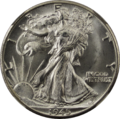From today's featured articleThe Walking Liberty half dollar is a silver 50-cent piece that was designed by Adolph A. Weinman and issued by the United States Mint from 1916 to 1947. In 1915, the new Mint director, Robert W. Woolley, incorrectly believed that he was not only allowed but required by law to retire coin designs that had been in use for 25 years. He began replacing the Barber coinage: dimes, quarters and half dollars bearing similar designs, first struck in 1892 by long-time Mint Engraver Charles E. Barber. Weinman's design of Liberty striding towards the Sun for the half dollar proved difficult to perfect, and it never struck well, which may have been a factor in its replacement by the Franklin half dollar beginning in 1948. Nevertheless, art historian Cornelius Vermeule considered the piece to be among the most beautiful US coins. Since 1986, a modification of Weinman's obverse design has been used for the American Silver Eagle, and the half dollar was issued in gold for its centennial in 2016. (Full article...)
Recently featured:
Did you know...
|
In the news Bartholomew I hands the tomos of autocephaly to Metropolitan Epiphanius.
On this day
William Dugard (b. 1606) · Carrie Chapman Catt (b. 1859) · Lei Jieqiong (d. 2011)
More anniversaries:
|
Today's featured picture

|
Paxillus involutus, the common roll-rim, is a fungus widely distributed across the Northern Hemisphere; it has also been unintentionally introduced to Australia, New Zealand, and South America. The brownish fruit body grows up to 6 cm (2.4 in) high. It has a funnel-shaped cap up to 12 cm (5 in) wide with a distinctive in-rolled rim and decurrent gills close to the stalk. Genetic testing suggests that the fungus may be a species complex rather than a single species. A common mushroom of deciduous and coniferous woods and grassy areas in late summer and autumn, P. involutus is symbiotic with the roots of many tree species, reducing the trees' intake of heavy metals and increasing their resistance to pathogens. Previously considered edible and eaten widely in Eastern and Central Europe, the mushroom has been found to be dangerously poisonous; in 1944, it killed the German mycologist Julius Schäffer. It can trigger the immune system to attack red blood cells with potentially fatal complications, including acute kidney and respiratory failure. Photograph: Petar Milošević
Recently featured:
|
Other areas of Wikipedia
- Community portal – Bulletin board, projects, resources and activities covering a wide range of Wikipedia areas.
- Help desk – Ask questions about using Wikipedia.
- Local embassy – For Wikipedia-related communication in languages other than English.
- Reference desk – Serving as virtual librarians, Wikipedia volunteers tackle your questions on a wide range of subjects.
- Site news – Announcements, updates, articles and press releases on Wikipedia and the Wikimedia Foundation.
- Village pump – For discussions about Wikipedia itself, including areas for technical issues and policies.
Wikipedia's sister projects
Wikipedia is hosted by the Wikimedia Foundation, a non-profit organization that also hosts a range of other projects:
Free media repository
Wiki software development
Wikimedia project coordination
Free textbooks and manuals
Free knowledge base
Free-content news
Collection of quotations
Free-content library
Directory of species
Free learning materials and activities
Free travel guide
Dictionary and thesaurus


